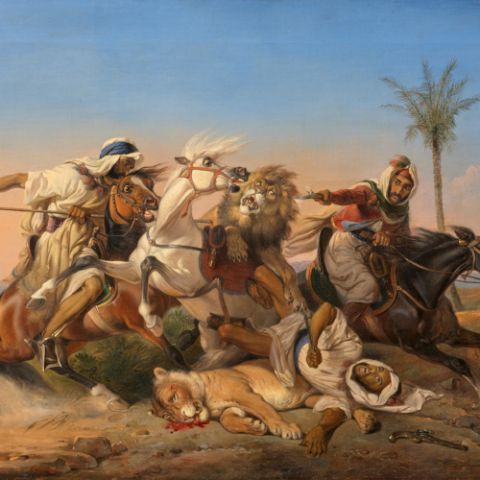
Lot was sold
Lot 1182 | Franz von Stuck | Dancer
Estimate
20.000
- 30.000
€
D
Result:
(incl. premium)
25.080 €
STUCK, FRANZ VON
1863 Tettenweis - 1928 Tetschen
Title: Dancer.
Date: Draft 1898, casting before 1906.
Technique: Bronze, green-black-patinated.
Measurement: 63 x 33 x 17cm.
Notation: Inscribed in front on the plinth edge: "Franz Stuck".
Foundry Mark: Foundry drawing verso on the plinth: "C. Leyrer München".
Literatur3:
O.J. Bierbaum: Stuck, Künstler Monographien, Bielefeld and Leipzig 1899 (ill. 145 and 146);
T. Raff: "Die Kraft des Mannes und die weiche Schmiegsamkeit des Weibes": Franz von Stuck: Das plastische Werk. Exhib. cat. Franz von Stuck Geburtshaus Tettenweis 2011, p. 48-52 with ill.
Provenance:
Private ownership, Germany.
Women's portraits are essential in Franz von Stuck's early work. With his most famous, symbolist work "Die Sünde" (The Sin), he characterised the view of women around 1900 with the erotic female type of the "femme fatale". A strong affinity to antiquity and Romanism as well as his fascination for the female being shaped his work. The majority of his work deals with the mysteriousness of women and the ambivalence of human sexuality.
Around 1900, society still disapproved of a woman of status practising a profession. Working as an actress or even a dancer was frowned upon. Nevertheless, some of these women contributed to the inspiration of writers and painters with their creative performances. Stuck dedicated several of his works to such women. An outstanding example of the combination of contemporary Art Nouveau influences under the dancer Loie Fuller with antique models is lot 1182, the 63 cm high bronze "Dancer". The young woman in light garments sensually abandons herself to dance in a dynamic turning movement. It is one of his early casts, for which his wife Mary Lindpaintner, whom he married in 1897, posed. A year later, the bronze was shown for the first time at the Secession exhibition in Munich.
Stuck was one of the most influential and central figures of the Fin de siècle in Munich. In 1892, he founded the Münchener Secession together with his artist colleague Wilhelm Trübner that can be understood as a counter pole to the established artists. In his pursuit for the total artwork, Stuck was able to create a unique synthesis of painting, sculpture and decorative art.
1863 Tettenweis - 1928 Tetschen
Title: Dancer.
Date: Draft 1898, casting before 1906.
Technique: Bronze, green-black-patinated.
Measurement: 63 x 33 x 17cm.
Notation: Inscribed in front on the plinth edge: "Franz Stuck".
Foundry Mark: Foundry drawing verso on the plinth: "C. Leyrer München".
Literatur3:
O.J. Bierbaum: Stuck, Künstler Monographien, Bielefeld and Leipzig 1899 (ill. 145 and 146);
T. Raff: "Die Kraft des Mannes und die weiche Schmiegsamkeit des Weibes": Franz von Stuck: Das plastische Werk. Exhib. cat. Franz von Stuck Geburtshaus Tettenweis 2011, p. 48-52 with ill.
Provenance:
Private ownership, Germany.
Women's portraits are essential in Franz von Stuck's early work. With his most famous, symbolist work "Die Sünde" (The Sin), he characterised the view of women around 1900 with the erotic female type of the "femme fatale". A strong affinity to antiquity and Romanism as well as his fascination for the female being shaped his work. The majority of his work deals with the mysteriousness of women and the ambivalence of human sexuality.
Around 1900, society still disapproved of a woman of status practising a profession. Working as an actress or even a dancer was frowned upon. Nevertheless, some of these women contributed to the inspiration of writers and painters with their creative performances. Stuck dedicated several of his works to such women. An outstanding example of the combination of contemporary Art Nouveau influences under the dancer Loie Fuller with antique models is lot 1182, the 63 cm high bronze "Dancer". The young woman in light garments sensually abandons herself to dance in a dynamic turning movement. It is one of his early casts, for which his wife Mary Lindpaintner, whom he married in 1897, posed. A year later, the bronze was shown for the first time at the Secession exhibition in Munich.
Stuck was one of the most influential and central figures of the Fin de siècle in Munich. In 1892, he founded the Münchener Secession together with his artist colleague Wilhelm Trübner that can be understood as a counter pole to the established artists. In his pursuit for the total artwork, Stuck was able to create a unique synthesis of painting, sculpture and decorative art.
Contact:
Print this lot | Recommend lot |
Conditions of this Lot
VAT margin scheme, VAT included, but must not be indicated, not refundable
32% buyer’s premium on the hammer price
32% buyer’s premium on the hammer price
Estimated shipping costs for this lot:
Arrangement after auction.
Similar works in the auction
Franz von Stuck Germany Munich Secession Munich School 19th/20th C. Bronzes Dance / Dancer Bronze Art
Franz von Stuck Germany Munich Secession Munich School 19th/20th C. Bronzes Dance / Dancer Bronze Art
Stock Id: 76201-11







